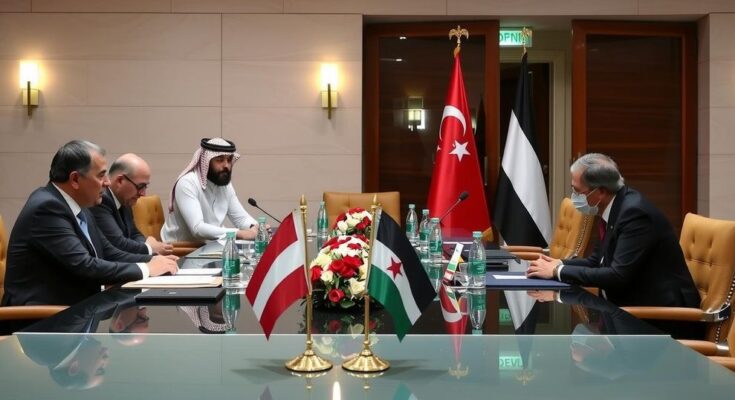Israel’s Prime Minister Netanyahu sends Mossad director David Barnea to Qatar amid ceasefire talks, signifying potential progress in negotiations concerning the Gaza conflict. U.S. pressure for an agreement before January 20, coupled with the urgency for hostages’ return, underscores the critical nature of these talks. Continued airstrikes and the humanitarian crisis in Gaza amplify the need for resolution.
Israeli Prime Minister Benjamin Netanyahu is dispatching the director of the Mossad intelligence agency, David Barnea, to Qatar to engage in ceasefire negotiations, indicating a potential advancement in the ongoing dialogues relating to the conflict in Gaza. The timeline for Mr. Barnea’s visit remains unclear, yet it aligns with increasing U.S. pressures to finalize an agreement prior to the upcoming presidential inauguration on January 20. This marks a significant involvement of high-level Israeli officials, which may facilitate the signing of any potential agreements.
Amidst the continuing violence, Gaza health officials report that over 46,000 Palestinians have died since the onset of the conflict, predominantly women and children. Historically, ceasefire initiatives have faltered, with only one brief cessation realized in 15 months of warfare. Current discussions revolve around a phased ceasefire proposal, where Netanyahu has expressed commitment primarily to the immediate release of hostages in exchange for a cessation of combat operations. Hamas, however, is demanding a complete withdrawal of Israeli forces from Gaza, presenting a significant diplomatic challenge.
Additionally, high-ranking officials from Israel’s security agencies, including the Shin Bet internal security service, will accompany Mr. Barnea. This strategic deployment follows consultations with national defense executives and negotiations with representatives from both the outgoing and incoming U.S. administrations. Many families of the hostages taken during the conflict are urging swift action from Netanyahu, emphasizing the urgency of resolving their plight, especially after recent discoveries of deceased hostages.
U.S. Secretary of State Antony Blinken remarked that a deal appears to be imminent, with hopes to finalize it before the transition to the new administration. Notably, the complex negotiations involve the determination of released hostages, the conditions for Palestinian prisoner releases, and the extent of any Israeli military withdrawal from populated areas in Gaza. While the conflict has claimed many lives and led to significant destruction, the focus on negotiations reflects a commitment to ameliorate the dire humanitarian situation in the region.
In the aftermath, several airstrikes have intensified, further deepening the humanitarian crisis. Local reports indicate children and families are becoming increasingly vulnerable, exacerbating their need for assistance.
The ongoing conflict between Israel and Hamas has seen significant casualties and destruction, particularly in Gaza, with recent reports citing over 46,000 Palestinian deaths. Ceasefire talks have been a crucial yet difficult aspect of diplomatic efforts, hindered by diverging demands from both sides, particularly concerning hostages and military presence. The international community, led by the United States, has been actively involved in mediating these discussions, underscoring the geopolitical dimensions of the crisis. The involvement of Israeli top officials in negotiations signals a potential shift towards addressing the humanitarian concerns arising from the prolonged violence.
The dispatch of Mossad’s director to Qatar for ceasefire negotiations represents a significant step toward potentially resolving the ongoing conflict. With increasing pressure from the U.S. and urgent demands from hostages’ families, this development could pave the way for a crucial agreement aimed at alleviating the humanitarian toll wrought by the prolonged violence. However, substantial challenges remain, particularly in reconciling differing demands from both Israeli and Hamas representatives, showcasing the complexity of achieving lasting peace.
Original Source: www.pbs.org




